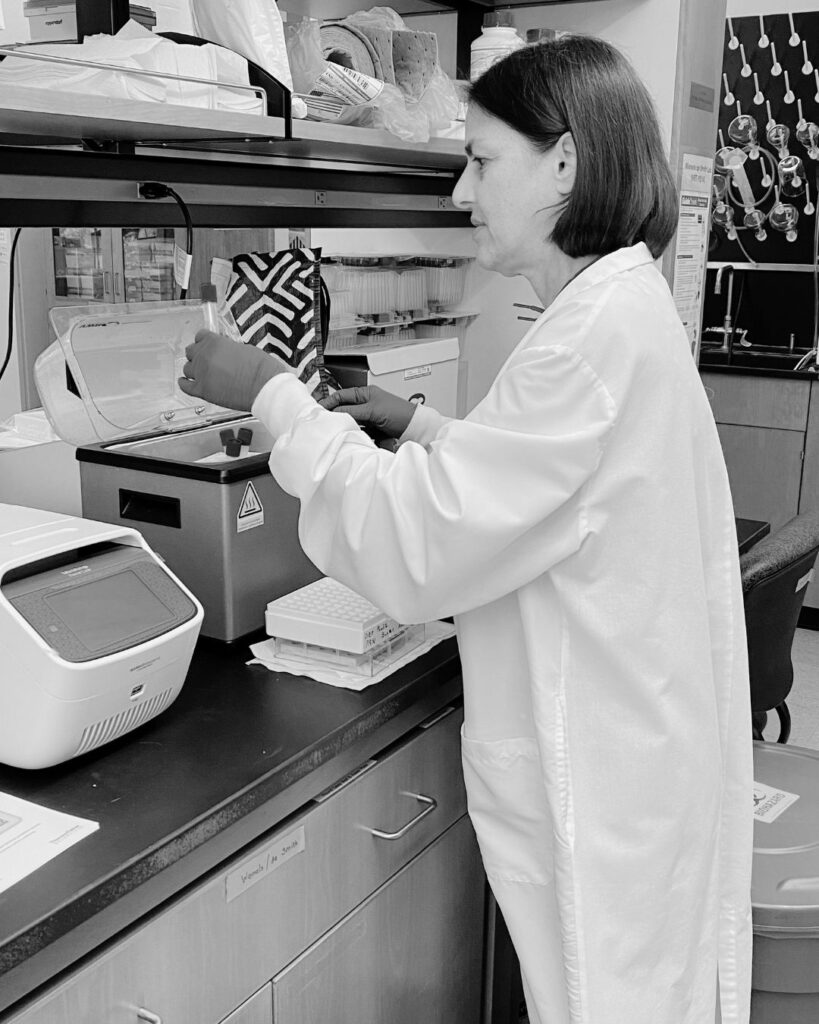A new study published in Nature reveals abnormally high levels of the hormone GDF15, and increased sensitivity to it, are the major factors contributing to HG. The most severe form of nausea and vomiting during pregnancy, called Hyperemesis Gravidarum (HG), can be life-threatening to both mother and baby. HG is associated with adverse maternal and child outcomes.
Dr. Marlena Fejzo lost a baby due to the pregnancy complication, hyperemesis gravidarum, in 1999 and has been researching the cause ever since. “While I have worked, people have continued to contact the HER Foundation with heartbreaking stories like my own, begging for answers. I think we finally have the solution.”
Dr. Marlena Fejzo, Hyperemesis Education and Research (HER) Foundation Research Advisor and Board Member, and her team previously identified three independent genetic variants in GDF15, all of which strongly increase the risk of developing HG. GDF15 is known to cause nausea, vomiting, and appetite changes. The new study, first-authored by HER Foundation’s Dr. Fejzo and co-authored by HER’s Executive Director Kimber MacGibbon, was led by Dr. Stephen O’Rahilly at the University of Cambridge and includes an international team of researchers.

The study reveals that carrying the predisposing GDF15 genes results in low levels of the hormone when not pregnant. GDF15 is produced at very high levels by the placenta in early pregnancy. People with a genetic predisposition for lower levels before pregnancy become hypersensitive to the rapid rise of the hormone in early pregnancy.
This research shows that mice pretreated with a low dose of GDF15 can become desensitized to the hormone. It also reveals that patients with beta-thalassemia (a blood disease associated with elevated levels of circulating GDF15 in the non-pregnant state) are unlikely to have nausea and vomiting in their pregnancies. The work suggests that, in the future, HG may be prevented by raising GDF15 levels prior to pregnancy using a priming strategy.
Impact on the treatment of Hyperemesis Gravidarum (HG)
“This is great news for HG patients,” says MacGibbon. “One of the most common questions people ask the Foundation team is whether anything new is available to prevent HG. The recurrence risk of HG is as high as 80%. So people fear subsequent pregnancies and are ready to try anything to prevent HG.”
The study confirmed that people with HG can have significantly higher circulating levels of GDF15 during pregnancy. Circulating GDF15 levels are also abnormally high in patients with cancer-associated nausea and vomiting, such as cachexia and chemotherapy-induced vomiting. Several drugs blocking the pathway are already in clinical trials for cancer patients.
“These drugs should be tested in HG patients, and, if safe, may be a game-changer for HG,” says Fejzo. This study provides the first human evidence to support the safety of lowering GDF15 in pregnancy by reporting on healthy mother-child pairs where both carry a mutation in GDF15 that presumably results in lower maternal and fetal GDF15 levels.
The study also provides the first suggestive evidence that an interaction between maternal and fetal genes plays a role in recurrence risk. However, larger studies are needed to confirm this.
About the HER Foundation
The Hyperemesis Education and Research (HER) Foundation is a 501(c)3 nonprofit. HER provides support, groundbreaking research, advocacy, and education on hyperemesis gravidarum (HG), a debilitating disease of pregnancy. Since 2000, HER has been the leading source of information and research on HG. HER has been a resource for over 2,500,000 people.
DOI: 10.1038/s41586-023-06921-9.
- Frequently asked questions about genetics and hormone GDF15.
- Watch our Instagram Live with Dr. Marlena Fejzo discussing the Nature study!
- Find out more about the HER Foundation and media inquiries.
- Read about the international research conference (ICHG Nov 6-7, 2024).
- Review article by Keck School of Medicine at USC.
- Participate in our ongoing research opportunities.
- Share your HG story and offer to speak to the media.
- Become a HER Volunteer and help another family with HG.
- Sign up for our newsletter to be up-to-date on the latest research, news, and updates!
©2023 HER Foundation. All rights reserved.

